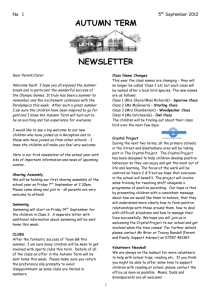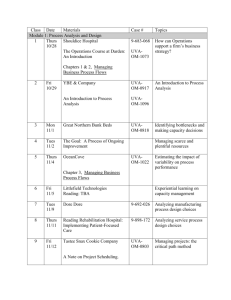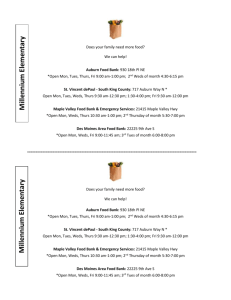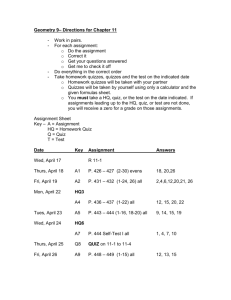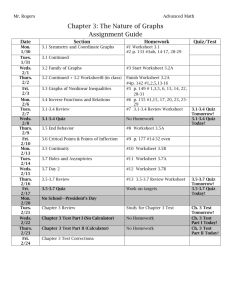BIO347 - Lycoming College
advertisement
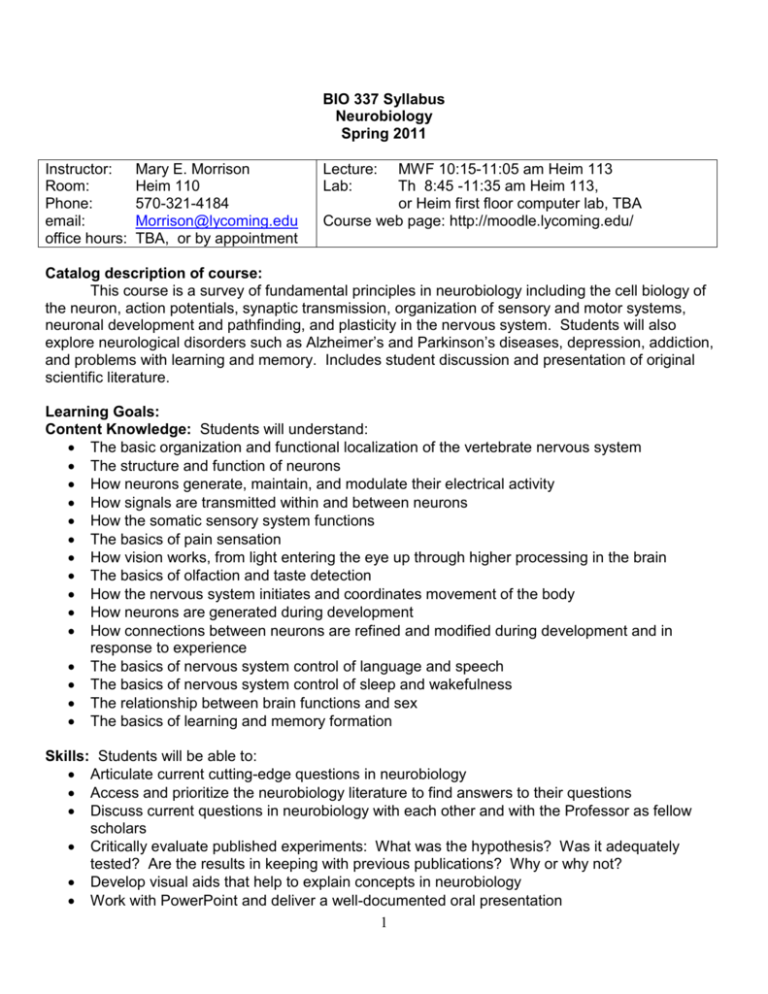
BIO 337 Syllabus Neurobiology Spring 2011 Instructor: Room: Phone: email: office hours: Mary E. Morrison Heim 110 570-321-4184 Morrison@lycoming.edu TBA, or by appointment Lecture: Lab: MWF 10:15-11:05 am Heim 113 Th 8:45 -11:35 am Heim 113, or Heim first floor computer lab, TBA Course web page: http://moodle.lycoming.edu/ Catalog description of course: This course is a survey of fundamental principles in neurobiology including the cell biology of the neuron, action potentials, synaptic transmission, organization of sensory and motor systems, neuronal development and pathfinding, and plasticity in the nervous system. Students will also explore neurological disorders such as Alzheimer’s and Parkinson’s diseases, depression, addiction, and problems with learning and memory. Includes student discussion and presentation of original scientific literature. Learning Goals: Content Knowledge: Students will understand: The basic organization and functional localization of the vertebrate nervous system The structure and function of neurons How neurons generate, maintain, and modulate their electrical activity How signals are transmitted within and between neurons How the somatic sensory system functions The basics of pain sensation How vision works, from light entering the eye up through higher processing in the brain The basics of olfaction and taste detection How the nervous system initiates and coordinates movement of the body How neurons are generated during development How connections between neurons are refined and modified during development and in response to experience The basics of nervous system control of language and speech The basics of nervous system control of sleep and wakefulness The relationship between brain functions and sex The basics of learning and memory formation Skills: Students will be able to: Articulate current cutting-edge questions in neurobiology Access and prioritize the neurobiology literature to find answers to their questions Discuss current questions in neurobiology with each other and with the Professor as fellow scholars Critically evaluate published experiments: What was the hypothesis? Was it adequately tested? Are the results in keeping with previous publications? Why or why not? Develop visual aids that help to explain concepts in neurobiology Work with PowerPoint and deliver a well-documented oral presentation 1 Summarize classic experiments, including their assumptions, limitations, and implications Apply what they learn to their own daily activities Act as ambassadors of neuroscience when communicating with the public, including middle school-age students Prerequisites: Bio 110-111. Textbook (required): Neuroscience, D. Purves, G.J. Augustine, D. Fitzpatrick, W.C. Hall, A.-S. LaMantia, J.O. McNamara, and L.E. White, editors. 2008 (fourth edition). Sinauer. Some primary literature readings will be provided through Moodle postings. Course Schedule: Mon 1/10 Weds 1/12 Thurs 1/13 Fri 1/14 Lecture Topics (Book Chapters) Course Introduction; Organization of the Nervous System I (1) Organization of the Nervous System II (1) -- Mon 1/17 Weds 1/19 Thurs 1/20 Organization of the Nervous System III (1); End of Drop/Add Period Electrical Signals I (2,4) Electrical Signals II (2,4) -- Fri 1/21 Mon 1/24 Weds 1/26 Thurs 1/27 Action Potentials I (2,3) Action Potentials II (2,3) Action Potentials III (2,3) -- Fri 1/28 Mon 1/31 Weds 2/2 Thurs 2/3 Action Potentials IV (2,3) Synaptic Transmission I (5) Synaptic Transmission II (5) -- Fri 2/4 Mon 2/7 Weds 2/9 Thurs 2/10 Exam 1 Sleep and Wakefulness (28) Neurotransmitters and Receptors I (6) -- 2 Lab Activities --1. Who’s Who in the Nervous System: Immunohistochemistry and Staining ---2. Gross Anatomy and Function of the Brain; Quiz 1 ---3. Neurons in Action (NIA): Membrane, Equilibrium Potential, and Na Action Potential Tutorials; Quiz 2 ---4. NIA: Threshhold and Patch Voltage Clamp Tutorials; Quiz 3; Brainstorm Individual Project Ideas ---No lab--Dr. M. at NSF grant review Curtin visits later in the semester will substitute for this week’s wet lab time Fri 2/11 Mon 2/14 Weds 2/16 Thurs 2/17 No class--Dr. M. at NSF grant review Neurotransmitters and Receptors II (6) Neuronal Signaling (7) -- Fri 2/18 Mon 2/21 Weds 2/23 Thurs 2/24 Vision: The Eye I (11) Vision: The Eye II (11) Vision: Central Pathways I (12) -- Fri 2/25 Mon 2/28 Weds 3/2 Thurs 3/3 Vision: Central Pathways II (12) Somatic Sensory System (9) Pain (10) -- Fri 3/4 Mon 3/7 Weds 3/9 Thurs 3/10 Smell and Taste I (15) Exam 2 Smell and Taste II (15) -- Fri 3/11 Movement I: Lower Motor Neuron Circuits (16) Spring Break—No classes Spring Break—No classes -Spring Break—No classes Movement II: Lower Motor Neuron Circuits (16,17) Movement III (17) -Motor Control and Motor Learning I (19,20) Motor Control and Motor Learning II (19,20) Neurogenesis (22) -- Mon 3/14 Weds 3/16 Thurs 3/17 Fri 3/18 Mon 3/21 Weds 3/23 Thurs 3/24 Fri 3/25 Mon 3/28 Weds 3/30 Thurs 3/31 Fri 4/1 Mon 4/4 Axon Guidance and Synaptic Competition I (23) Exam 3 ---5. Neurological Disease Research; Quiz 4 ---6. Prep for Curtin Middle School outreach activity Quiz 5; Preliminary Individual Project Literature List due ---7. Prep for Curtin Middle School outreach activity; Curtin school visit #1 ---8. NIA: Unmyelinated, Passive Axon, Myelinated, and Partially Demyelinated Axon Tutorials; Quiz 6; Individual Project Annotated Bibliography Draft Due ---Spring Break—No lab ---9. BioPac Electrooculography; Quiz 7 ---10. Mapping Disease Genes: SCA-1 and Rett Syndrome; Quiz 8; Individual Project Annotated Bibliography Final Versions Due; Curtin school visit #2 --- 3 Weds 4/6 Thurs 4/7 Fri 4/8 Mon 4/11 Weds 4/13 Thurs 4/14 Fri 4/15 Mon 4/18 Weds 4/20 Thurs 4/21 Fri 4/22 Fri 4/29 Axon Guidance and Synaptic Competition II (23) -- -- Axon Guidance and Synaptic Competition III (23) Experience and Plasticity I (24,25) Experience and Plasticity II (24,25) -- Language and Speech (27) Sex and the Brain (30) Memory (31) -no class—Good Friday holiday Comprehensive Final Exam 8:30-11:30 am 11. Immunocytochemistry: Staining neurons; Quiz 9; Individual Project PowerPoint Drafts due ---12. Immunocytochemistry: Microscopy of neurons; Quiz 10; Individual Project Papers due; Curtin School visit #3 ---Quiz 11; Student Presentations --- Lectures (required): Monday, Wednesday, and Friday 10:15-11:05 am Heim 113 Lecture attendance is mandatory. If you are absent more than three times during the semester, your grade will be reduced by one letter grade for each additional absence (e.g. if you miss 5 lecture periods, and you earn a B according to points earned, your first 3 misses carry no penalty, but your final grade will be reduced to a C+ to reflect the 2 additional misses). If you are absent more than five times during the semester, I will notify your advisor and further grading penalties will apply. To encourage you to keep up with the readings and to review your lecture notes regularly, I will begin each lecture session by choosing students at random to identify the key points of the previous lecture, and to answer questions pertaining to those points. Come to lecture on time and be prepared for this brief interactive oral quiz. Please refrain from eating during class because it is distracting to you, to me, and to other students. Please place all cell phones on vibrate or turn the ringer off, as ringing in class is disruptive. I will always be available immediately after class for questions--stop by up front after the lecture. Laboratory (one three-hour session per week, required): Thursday 8:30-11:35 am Heim 113 Note: Order and topic of labs is subject to change according to equipment and space availability, and will be announced in class as needed For many of our labs, we will use Neurons in Action 2, a computer software package that simulates the experiments conducted in a modern electrophysiology laboratory and demonstrates the 4 fundamental principles of how neurons work. You will be provided with a personal copy of the Neurons in Action 2 manual during the first week of classes. For many labs, we will work through a Neurons in Action 2 Tutorial and then discuss an original research publication. We will be reading and discussing some of the classic papers in Neurobiology. Readings will be assigned a week in advance and will be made available through Moodle whenever possible. You are responsible for reading the material in the lab packet or the assigned readings BEFORE you set foot in the lab. Failure to complete the readings in advance will cost you and your lab group time, and may make it impossible for you to complete the exercise in the time allotted, or to participate in the group discussion. Each lab session will begin with a quiz covering the previous week’s tutorial and discussion material, and the basic underpinnings of the reading assigned for the current lab day. You may drop your lowest Quiz score, keeping the 10 highest scores for final grade calculations. Some of our lab sessions will be held jointly with Dr. Gilbertson’s Physiological Psychology labs—see the Curtin Middle School Visits section below. Lab sessions are mandatory. Because many of the lab exercises are carried out across multiple days, missing a lab session creates serious disruptions in future lab sessions, and is fundamentally rude to your lab partner. If you miss 1 lab session, there is no grading penalty other than the loss of the 20 points from that day’s quiz (but again, this is very rude to your lab partner, and can make it difficult for you to pick up during the next session). If you miss 2 lab sessions, your grade will be reduced by 3 levels (e.g. from a B to a C). If you miss more than 2 labs without a legitimate documented excuse (see below), you will automatically fail the course. Individual Student Presentation To provide an opportunity for you to learn more in depth about a neuroscience topic that interests you, each student will prepare a research paper and deliver a 20-to-30-minute oral presentation of the paper complete with PowerPoint slides, references, and handouts. This can be a presentation on a specific disease, circuit, behavior, or sense that is not covered in our regular Syllabus (see above). To keep you on track with your paper/presentation development, I will announce intermediate deadlines as the course progresses. Class participation: To encourage students to take ownership of the learning process, each student is expected to arrive in class ready to answer questions about the material from the previous class. At the beginning of the class period, I will either present several review questions, or ask students to summarize the key points of the previous lecture. First I’ll ask for volunteers and then, if necessary, I’ll call on students at random to provide the answers. I determine which students to call on each day by rolling dice, so over time everyone will be called on with equal probability. I will model this interaction during the first and second class periods, and I will call on students during the third class period and for the remainder of the semester. To reflect my assumption that every student arrives in class willing and able to participate even if s/he is not called on that day, each student will start the semester with 50 class participation points. Students who are prepared and respond appropriately when called upon will incur no penalty or deduction from the 50-point class participation grade. Any student who is unprepared or absent when called upon will lose 10 points of class participation credit. Students who volunteer to answer questions will gain 5 points in the class participation grade, but no student will earn more than 50 5 points total for class participation. However, I reserve the right to adjust final letter grades upward to reward regular and constructive participation in class beyond the mathematical 50-point limit. Curtin Middle School Visits: The best way to know whether you’ve mastered a concept is to be able to teach it to someone else. To give the class a chance to put this principle into practice, groups of students will develop fun, interactive demonstrations of basic neuroscience principles, and then we will take these demonstrations into Curtin Middle School as a part of their lunchtime New Learning Enrichment Program. We will work with 15-20 middle school students each week on 5 different Fridays during the semester. Each Bio 337 student is required to take part in at least one of these sessions, but all Bio 337 students are encouraged to come share in the fun each week. Our Enrichment program title is “Brains Are Us!” The description for this mini-course is as follows: What do you know about your own brain? What does it look like, how does it work, and how can you help it to learn and remember better? How do optical illusions work? What happens in brain diseases like Alzheimer’s? How can the human brain heal itself after a traumatic injury? Why is it important to wear bicycle and motorcycle helmets? This course will explain the basics of brain science, using fun interactive demonstrations to explain your brain! Course grading: Grades will be determined based on the following assessments: 3 In-class Exams 3 x 100 points= 300 points Final exam 100 points Laboratory Quizzes 10 x 20 points = 200 points Curtin Middle School Activity 100 points Class Participation 50 points Individual Student Paper and Presentation 150 points Total possible 900 points In addition to the required course components above, you have the option of completing Practice Question Sets that will be due 10 times throughout the semester, for a maximum of 10 points each. If you score a perfect 10 on all 10 optional Practice Question Sets, you will be able to add 100 points to your total. If you choose not to hand in the Practice Question Sets, there will be no penalty—however, these Practice Questions are the best way for you to prepare for the Exams, and failure to hand them in is equivalent to throwing away bonus course points. Your grade will be determined by the number of course points you earn, minus any penalties for missed classes or labs (see above). Conversion of % of possible course points earned into letter grades is as follows: A 93.4% or above (Lycoming College does not give A+ grades) A90-93.3% B+ 86.7-89.9 B 83.4-86.6 B80-83.3 C+ 76.7-79.9 C 73.4-76.6 C70-73.3 D+ 66.7-69.9 D 63.4-66.6 D60-63.3 F 59.9 or below Makeup exams, labs, or presentations: All makeup exams or presentations will be in the form of an oral examination by the Instructor. 6 Makeup exams or presentations will only be scheduled if the student has a bona fide medical excuse, religious conflict, family tragedy, or college sanctioned event that prevents the student from being present on the scheduled day of the exam or presentation. Medical excuses will require the student to provide a written, dated notice from a physician explaining the student’s absence from the scheduled exam or presentation on the next class or lab day after the absence. Policy on cheating and plagiarism: From the 2010-2011 Lycoming College Academic Catalog: The College assumes that students are committed to the principle of academic honesty. Students who fail to honor this commitment are subject to dismissal. Procedural guidelines and rules for the adjudication of cases of academic dishonesty are printed in The Student Handbook. A note on how the brain learns: Come see the poster outside my office, Heim 110, entitled “While you teach them how the brain remembers, teach them how to memorize.” Use what you’re learning about brain function to make the most of your study time! How to succeed in this class: I expect you to spend an average of 2 or more hours working on the material outside of class or lab for every 1 hour I am with you. This translates to at least 6-8 hours of work outside of class every week. Skim the assigned readings before class, so you can focus on the fine points in lecture. Come to class on time and attentive, ready with questions. Take good notes of your own to fill in the details beyond the online lecture notes. Ask questions at the end of each lecture--don’t let any confusion or misunderstanding or brilliant insight go until another day. After the lecture, read the assigned readings in detail to consolidate what we’ve covered in class (but remember, exams will cover lecture points not found in the text, and lectures will show you which text points to focus on when the text goes into too much detail). Before each lab, read through the lab manual and write down any questions or points of confusion. Bring these up at the beginning of the lab session. There is no such thing as a stupid question when it comes to lab work! Keep up with the material throughout the semester to avoid cramming before exams. The daily oral summaries, weekly practice questions and lab quizzes are designed to help you budget your time and motivate you to review your notes on a regular basis. Come see me during office hours--I like to talk with you, and I do think about other subjects beyond neurobiology! If you are interested in going into more detail on a subject, jot it down and come talk with me. It could become the starting point for an Individual Research Project, or a later Independent Study. 7


